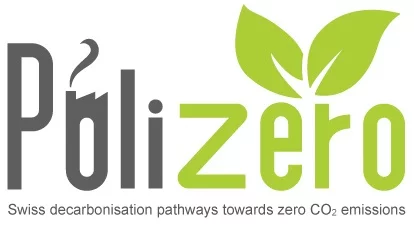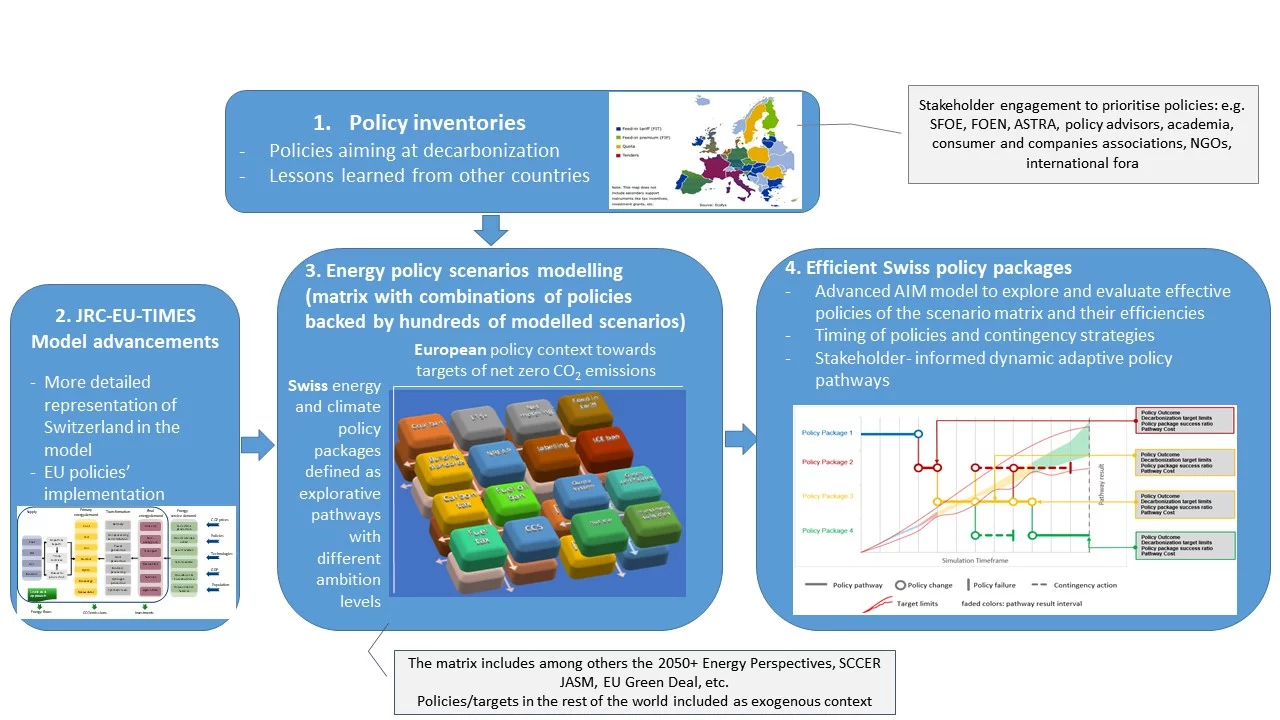Objectives
POLIZERO addresses the topic of efficient policies for promoting the energy transition towards a decarbonised Swiss energy system in a European context. We analyse existing and future policy mixes to promote low-carbon solutions, and, supported by involving stakeholders on policy evaluation, we employ a prospective quantitative analysis with an advanced European energy systems modelling framework combined with a policy analysis tool to identify Dynamic Adaptive Policy Pathways for Switzerland. We explicitly consider different future European policies and energy system configurations, sectoral and regional policy interdependencies. The outcome of this project contributes to the current dialogue on the energy transition in Switzerland, and on how Switzerland can achieve its CO2 mitigation targets while being embedded in European energy markets, which also face an equally ambitious emissions reduction target.
The specific research questions addressed in this project are:
- What are efficient policies/policy packages and their timing in Switzerland towards the target of net-zero CO2 emissions by 2050?
- What are the implications of energy and climate policies of other European countries for the effectiveness of Swiss energy policies?
- Which are the most critical contextual influences and their respective values that could affect policy outcomes, efficiency and efficacy?
- Which parameters should be monitored to ensure effective policy implementation and which policy alternatives (if any) could be implemented to tackle policy outcome deviations?
POLIZERO contributes in filling the critical knowledge gap of “when to act” to avoid carbon lock-ins and the implementation of policies that lead to dead-ends or cannot reach their aims. The project’s modelling framework, comprising of the JRC-EU-TIMES and TEEM AIM models, provides support to decision-makers to design adaptive policy pathways that ensure robustness and cost-effective achievement of the climate targets, and amplify the need for negative emissions.
Work structure
WP1 Inventory of policies in Switzerland and other major European countries
Based on a literature review and stakeholder consultation, WP1 performs a review of current and to be implemented policies (in energy demand and supply) and decarbonisation targets for Switzerland and leading European countries. Appropriate indicators to quantify the policies’ achievements, as well as contextual factors affecting policy performance, are defined. Furthermore, the needs of stakeholders in terms of policy planning are elicited to frame the inputs and outputs of the modelling framework (WPs 2-4). A stakeholder engagement plan, based on electronic means considering the COVID19 outbreak, supports effective stakeholder engagement.
WP2 Advancement of the JRC-EU-TIMES and AIM soft-link scoping on the Swiss energy system
WP2 will perform advancements to the JRC-EU-TIMES model scoping on the Swiss energy system, to capture dynamics related to Swiss-specific energy policies. The task is based on the existing Swiss Energy Systems Model (STEM), which is operational at PSI and already contributed to a number of studies for the Swiss Federal Office for Energy. The database of STEM, as well as its key modelling features, will be transferred to the JRC-EU-TIMES to create an advanced, unique in its kind in Switzerland, modelling framework suitable to account in detail for the interdependency between the Swiss and European policies as well as between the Swiss and European energy systems.
WP3 Modelling of Swiss and European policies towards deep decarbonisation of the Swiss and European energy systems
WP3 identifies relevant Swiss policy measures for the prospective modelling, as well as the different European contexts in which the Swiss policies are investigated. This provides the basis for modelling the contextual factors and their uncertainty spaces as the context in which Swiss energy policies are implemented (i.e. national, regional, European, etc.). Ultimately, WP3 performs modelling of various combinations of policy packages through dedicated scenarios where not only Swiss energy policies are analysed individually but also their interaction and the adaptation of policies of other European countries.
WP4 Efficient Swiss policy mixes, pathways, and their success factors required to decarbonise the Swiss energy system
Within WP4, the Adaptive policymaking Model (AIM) will be applied for the design of dynamic adaptive policy pathways towards the achievement of decarbonisation sub-targets in Switzerland. Generation of policy pathways will be performed stepwise, considering diverse perspectives regarding the intermediate desired policy outcomes. A monitoring framework will provide concrete information to stakeholders, regarding the parameters they should monitor, with respect to potential policy changes under contextual influences.


